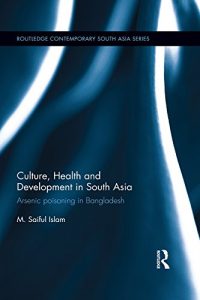Recently, mass arsenic poisoning of groundwater has emerged as a disastrous public health concern in Bangladesh. Apart from hundreds of deaths that have already been reported, 85 million people are estimated to be at high risk of developing deadly arsenicosis symptoms. The severity and extent of arsenicosis have obliged the government of Bangladesh to declare it the "worst national disaster" the country has ever faced, and further to be deemed a "state of emergency." To fight this pervasive public health disaster, the Bangladesh government has collaborated with the international and national NGOs to implement development projects to provide arsenic-free water to rural villagers.
Drawing upon ethnographic research in rural Southwestern Bangladesh, this book discusses arsenic contamination and its resultant health impact from a medical anthropological and anthropology of development perspectives. It examines how the actual patients perceive, explain, manage and respond to this catastrophic public health outbreak, and goes on to analyse how such lay perceptions shape health-seeking behaviour of subjects in a medically plural context. To make the issue more holistic, this book further examines mitigation strategies and community participation in these projects.
Challenging approaches to development and development project management, the book is of interest to policy makers, practitioners and academics working in the field of development studies, South Asian studies, medical anthropology, anthropology and sociology of development.






